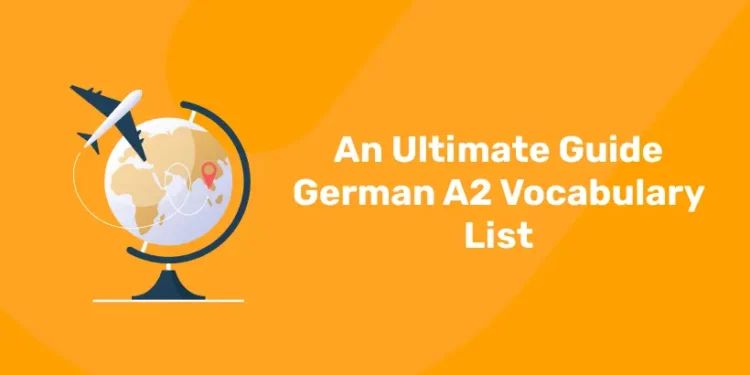Table of Contents
Introduction
Learning a foreign language like German opens doors to new cultures, travel opportunities, and global career possibilities. By the time you progress to the A2 level of the CEFR (Common European Framework of Reference for Languages), you should already be comfortable with everyday words and simple phrases introduced at the A1 level. At A2, you move a step closer to independence in communication – you can talk about your family, express likes and dislikes, discuss your surroundings, and manage day-to-day situations with more confidence.
Check out these videos on German language training by Entri in Malayalam!
This article provides you with a comprehensive German A2 vocabulary list that will help you strengthen your foundation and practice real-life scenarios such as greetings, introductions, ordering food, travel, and emergencies. Alongside vocabulary, it’s also important to understand the German A2 exam, which evaluates your skills at this stage.
German A2 Exam: Overview & Structure
1: How do you say "Good Morning" in German?
The German A2 exam is designed to test your ability to handle basic, everyday communication in German. It is a recognized certification accepted by institutions and employers in Germany and worldwide. Typically, learners attempt this level after completing around 150–300 hours of study, following their A1 certification.
Key Skills Tested in the A2 Exam:
-
Reading (Lesen):
-
Understand short texts such as letters, emails, notices, ads, and simple descriptions.
-
Identify important information in everyday contexts (e.g., supermarket offers, timetables).
-
-
Listening (Hören):
-
Comprehend frequently used expressions in conversations, radio announcements, or basic public messages.
-
Follow simple dialogues and instructions.
-
-
Writing (Schreiben):
-
Write short, structured texts such as postcards, personal letters, or emails.
-
Fill in basic forms with personal details (e.g., hotel check-in, registration forms).
-
-
Speaking (Sprechen):
-
Introduce yourself and answer questions on familiar topics.
-
Engage in simple role-play or dialogues such as shopping, ordering food, or asking for directions.
-
Express basic needs, opinions, or preferences.
-
Passing Requirement:
You will need to show proficiency across all four skills. The exam is generally structured into modules (reading, listening, writing, speaking), and many testing centers allow you to take all modules together or individually.
Duration of the Exam:
-
Usually around 80–90 minutes for the written parts (reading, writing, listening).
-
Around 10–15 minutes for the speaking part.
Recognition:
The A2 certification is accepted internationally and is often a requirement for certain visas, entry-level jobs, or as proof of your progress when learning German for academic purposes.
German A2 vocabulary is covered in detail in this article, which gives you a strong foundation to improve your language abilities and increase your comfort level when speaking and comprehending German. It will be easier and more pleasurable for you to go toward fluency if you can learn these words and use them successfully in a variety of setting.
Click here to join the Entri online German language course! Watch demo classes here!
Free German A1 Mock Tests – Powered by AI!
Test your skills on our interactive platform. Get instant feedback from our AI to help you communicate better and track your progress. Start your free German mock test now.
Test Your German A1 for FreeCharacteristics Of German A2 Vocabulary
The emphasis on commonplace words and phrases helps learners comprehend simple texts and participate in basic discussions. High-frequency words like food, family, house, and common areas are included. These words are frequently employed in simple phrases with simple grammatical constructions. Learners will find it easier to connect words with real-world references because the majority of the vocabulary is related to concrete objects and actions. Simple idiomatic expressions and colloquial phrases are introduced along with vocabulary at the A2 level, which is taught in the context of dining, shopping, and travel. Adding to the foundation from A1, this vocabulary set incorporates concepts that are culturally appropriate and help learners communicate beyond fundamental needs through repetition and diverse practice.
Ultimate German Vocabulary List
This extensive list of German A2 vocabulary covers all the bases, from introductions and greetings to placing food orders, requesting directions, and dealing with crises. These words and phrases will improve your trip experience and facilitate conversation, regardless of your level of German language proficiency. Continue reading to get the skills you need to confidently explore and interact with Germans.
Common Nouns In German
- der Bruder (brother)
- die Schwester (sister)
- der Freund (friend, male)
- die Freundin (friend, female)
- die Eltern (parents)
- die Großeltern (grandparents)
- der Ehemann (husband)
- die Ehefrau (wife)
- das Haus (house)
- die Wohnung (apartment)
- das Zimmer (room)
- die Küche (kitchen)
- das Bad (bathroom)
- das Bett (bed)
- der Tisch (table)
- der Stuhl (chair)
- das Brot (bread)
- der Käse (cheese)
- das Wasser (water)
- der Kaffee (coffee)
- das Obst (fruit)
- das Gemüse (vegetables)
- das Fleisch (meat)
- der Fisch (fish)
- die Schule (school)
- die Arbeit (workplace)
- der Park (park)
- das Geschäft (store)
- der Supermarkt (supermarket)
- das Krankenhaus (hospital)
- die Bibliothek (library)
- der Bahnhof (train station)
|
German A2 Exercises – Download Free PDF |
||
Basic Verbs In German
- essen (to eat)
- trinken (to drink)
- schlafen (to sleep)
- arbeiten (to work)
- lernen (to learn)
- lesen (to read)
- schreiben (to write)
- sprechen (to speak)
- gehen (to go)
- fahren (to drive/ride)
- laufen (to run)
- fliegen (to fly)
- kommen (to come)
- bleiben (to stay)
- reisen (to travel)
- machen (to do/make)
- nehmen (to take)
- geben (to give)
- bekommen (to get/receive)
- sehen (to see)
- hören (to hear)
- finden (to find)
- fragen (to ask)
Basic Adjectives In German
- groß (big/tall)
- klein (small/short)
- alt (old)
- jung (young)
- schön (beautiful)
- hässlich (ugly)
- freundlich (friendly)
- unfreundlich (unfriendly)
- neu (new)
- alt (old)
- teuer (expensive)
- billig (cheap)
- leicht (light)
- schwer (heavy)
- sauber (clean)
- schmutzig (dirty)
- glücklich (happy)
- traurig (sad)
- müde (tired)
- wach (awake)
- gesund (healthy)
- krank (sick)
- zufrieden (satisfied)
- wütend (angry)
Leverage “fillers”: If you get stuck during the speaking part, it’s okay to use a filler like “Ich bin nicht sicher, aber…” (“I’m not sure, but…”) to buy yourself a moment to think. The key is to stay calm!
Basic Adverbs In German
- immer (always)
- oft (often)
- manchmal (sometimes)
- selten (rarely)
- nie (never)
- sehr (very)
- zu (too)
- ganz (quite)
Basic Pronouns In German
- ich (I)
- du (you, informal)
- er/sie/es (he/she/it)
- wir (we)
- ihr (you all, informal)
- sie (they)
- Sie (you, formal)
Explore our free German language learning materials now!
Basic Conjunctions In German
- und (and)
- oder (or)
- aber (but)
- weil (because)
- dass (that)
- wenn (if)
- obwohl (although)
- während (while)
Basic Prepositions In German
- in (in)
- auf (on)
- unter (under)
- neben (next to)
- zwischen (between)
- vor (in front of)
- hinter (behind)
- mit (with)
German Words And Phrases For Introduction
It is customary to introduce yourself to new people. The standard expressions and words listed below are useful for introducing oneself, particularly when attempting to make acquaintances in a nation where German is spoken.
- Mein Name ist – My name is
- Wie heißt du? – What is your name?
- Schön dich kennenzulernen – Nice to meet you
- Woher kommst du? – Where are you from?
- Ich komme aus – I come from
- Wie geht es dir? – How are you?
- Es freut mich, dich kennenzulernen – I’m pleased to meet you
- Darf ich mich vorstellen? – May I introduce myself?
- Schön, dich wiederzusehen – Nice to see you again
|
Goethe 2025 Exam Dates: Multiple Centers |
|
| Trivandrum Goethe Exam Dates | Kochi Goethe Exam Dates |
| Chennai Goethe Exam Dates | Coimbatore Goethe Exam Dates |
German Words And Phrases For Greetings
- Hallo – A frequent greeting in German, is the English counterpart of “hello.” It’s a flexible, informal greeting that works well in both formal and informal contexts.
- Guten Morgen – When a person is greeted in the morning, they say “guten Morgen.” It’s a kind and amiable way to begin the day.
- Guten Tag – which translates to “good day,” is a common salutation used all day.
- Guten Abend – Good Evening
- Servus – is a popular greeting among friends and acquaintances that may be used to signify both “hi” and “bye.”
- Grüß Gott – The regional greeting “Grüß Gott” is primarily spoken in Austria and Southern Germany. It’s a polite method of greeting someone.
- Moin – In Northern Germany, especially in Hamburg and the neighboring areas, the greeting “moin” is frequently used. It is a colloquial style of greeting that is utilized all day long.
- Wie geht es Ihnen? – This is a formal approach to finding out how someone is doing. It’s a thoughtful and courteous way to strike up a conversation.
- Auf Wiedersehen – It is a polite and official method to say goodbye to someone.
- Tschüss – Tschüss is well-known across and appropriate for both official and informal situations.
German Words And Phrases For Emergency
Even while we sincerely hope you won’t have any emergency, being ready is always a good idea. In an emergency, you can utilize these sentences.
- Notfall – Emergency
- Hilfe – Help
- Feuer – Fire
- Unfall – Accident
- Krankenwagen – Ambulance
- Polizei – Police
- Krankenhaus – Hospital
- Verletzung – Injury
- Gefahr – Danger
- Rettung – Rescue
German Words And Phrases For Ordering Food
A must-do activity on any trip is to explore the local food. These expressions will assist you when placing food and beverage orders in a German-speaking institution.
- Speisekarte – Menu
- Bestellung – To order
- Vorspeise – Appetizer
- Hauptgericht – Main course
- Getränk – Drink
- Kellner/Kellnerin – Waiter/Waitress
- Dessert – Dessert
- Rechnung – Bill
Abschluss (Conclusion)
Acquiring proficiency in German calls for commitment, practice, and the appropriate tools. You may make consistent progress and appreciate the process by establishing clear objectives, fully immersing oneself in the language, and utilizing a range of learning resources and enjoy the process of mastering the language of German with Entri. With expert guidance, German A2 practice test, and A2 German exam papers, you’ll be able to pass the A2 prufung in no time! Keep in mind that each step you take will get you closer to comprehending and using one of the most significant languages in Europe for communication. Viel Erfolg! (Best of luck!)
| German Language Courses | |
| German Language A1 Course Online Coaching | German Language A2 Course |
| German Language B1 Course online Coaching | German Language B2 Course Online Coaching |
Free German A1 Mock Tests – Powered by AI!
Test your skills on our interactive platform. Get instant feedback from our AI to help you communicate better and track your progress. Start your free German mock test now.
Test Your German A1 for FreeFrequently Asked Questions
What does German A2 level mean?
The A2 level in German is the second stage in the CEFR framework, where learners can handle everyday conversations, introduce themselves, describe family, hobbies, and surroundings, and manage simple travel or shopping situations.
How difficult is the German A2 exam?
The A2 exam is considered basic to lower-intermediate and is not very difficult if you’ve completed A1 successfully. With around 150–300 hours of study and consistent practice in speaking, listening, reading, and writing, most learners find A2 manageable.
What is tested in the German A2 exam?
The exam typically includes:
-
Reading (Lesen): Understanding short texts and everyday notices.
-
Listening (Hören): Following short conversations and announcements.
-
Writing (Schreiben): Writing personal notes, emails, or forms.
-
Speaking (Sprechen): Introducing yourself, expressing basic needs, and engaging in simple dialogues.
How long is the German A2 exam?
-
Written parts (reading, listening, writing): 80–90 minutes
-
Speaking test: about 10–15 minutes
What is the passing score for A2 German?
Most institutions require around 60% overall, but the exact score can vary depending on whether you take the Goethe-Zertifikat, telc, or other standardized exams.
Is German A2 enough to live in Germany?
With A2, you can manage basic daily life situations such as shopping, transport, and introductions. However, for studying or working in Germany, higher proficiency like B1 or B2 is generally required.
How long does it take to learn German A2 level?
On average, learners spend 4–6 months reaching A2 after completing A1, depending on study frequency, resources, and practice. Intensive courses can shorten this time.
Do I need German A2 to apply for a student visa in Germany?
Not always. For English-taught programs, B1 or A2 may sometimes be enough, depending on the consulate requirements. For German-taught programs, A2 alone is not sufficient—you usually need B2 or C1.
Which is better: self-study or a German A2 course?
Self-study works for motivated learners, but structured online courses with live practice and mock exams (like those offered on Entri) greatly improve your chances of passing the A2 exam confidently.
What comes after German A2?
After A2, the next step is B1, which is the intermediate level. At B1, you can hold longer conversations, explain opinions, and understand more complex texts. B1 is also the first “independent speaker” stage.













